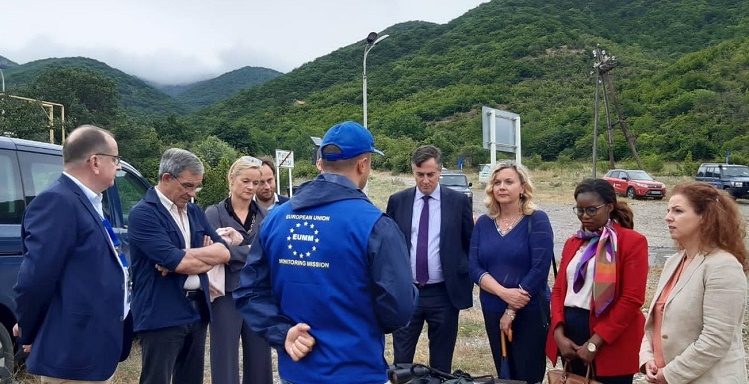European Parliament delegation visits occupation line in central Georgia to observe elements of Russian aggression

The European Union Monitoring Mission in Georgia accompanied the MEPs in the village of Odzisi. Photo: EUMM Georgia.
A six-member delegation of the European Parliament, on a visit to Georgia, on Thursday observed the consequences of the Russian aggression in the country by visiting the occupation line near the central Georgian village of Odzisi.
The European Union Monitoring Mission in Georgia, working along the administrative boundary since the Russia-Georgia war in 2008, accompanied the MEPs at the site, briefing them about the consequences of the conflict and violations of human rights on the occupied territories.
In Odzisi, the @EP_ForeignAff delegation were able to observe ‘borderisation’ elements with their own eyes. @EUMMGeorgia_HoM Marek Szczygieł stressed how the closure of the crossing point negatively affects the freedom of movement of the conflict-affected population. pic.twitter.com/2Ursl2hypo
— EU Monitoring Mission in Georgia (@EUMMGeorgia) July 21, 2022
At the occupation line, which separates the breakaway Tskhinvali (South Ossetia) region from the rest of Georgia, EUMM Mission Head Marek Szczygieł stressed how the closure of the crossing point over the boundary negatively affected the freedom of movement of the conflict-affected population.
Before their visit to the line, the EP delegation, led by the Chairman of the Committee on Foreign Relations, David McAllister, met with the Georgian Parliament Speaker Shalva Papuashvili, President Salome Zourabichvili, members of the opposition parties, Public Defender and non-governmental organisations this week.
The group, which includes MEPs Željana Zovko, Sven Mikser, Viola von Cramon, Thierry Mariani and Assita Kanko, is scheduled to meet with Prime Minister Irakli Garibashvili later today.
The EUMM said on Thursday it had conducted over 80,000 patrols since its deployment in September 2008 near the occupation lines in both Abkhazia and Tskhinvali regions to facilitate the resumption of a safe and normal life for the local communities living on both sides of the line.
Their mandate is valid throughout all of Georgia, however, the de facto authorities in the two occupied regions have so far denied their access to the territories under Russian control.
 Tweet
Tweet  Share
Share